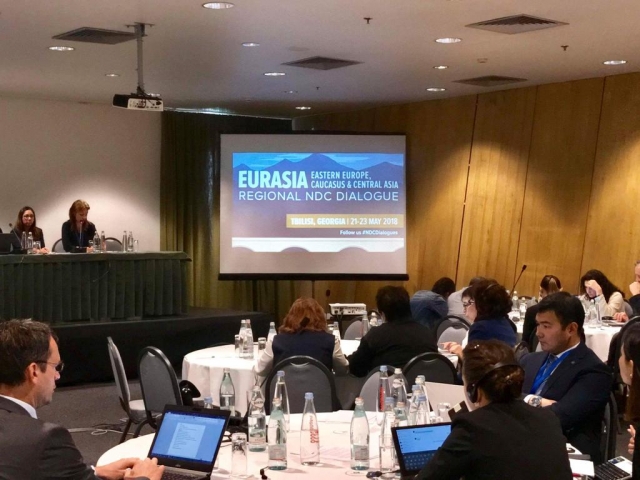Georgia Hosts Regional Dialogue on Climate Change
The Regional Dialogue on the implementation of the Paris Agreement in Eastern Europe, Central Asia and the Caucasus was held this week in Tbilisi. The event closed today, after three days of lively debate and intellectual and practical discussions on their challenges and successes at working towards the goals committed to within the framework of the 2015 Paris Agreement on Climate Change.
Sessions of the Dialogue included the Nationally Determined Contributions (NDCs) and gender issues, the NDCs and the Sustainable Development Goals, and the role of the private sector in climate action. Throughout the Dialogue, participants drew lessons from their current efforts to reduce greenhouse gas (GHG) emissions and exchanged experiences and ideas on moving to climate-resilient, low emission development.
The Regional Dialogue on Nationally Determined Contributions is co-organized by the UN Development Programme (UNDP) and the UN Framework Convention on Climate Change (UNFCCC) Secretariat, and hosted by the Government of Georgia. It was attended by more than 90 participants from 16 countries from the Eastern Europe, Central Asia, and Caucasus regions. The participants included members of government, academics, and civil society and the private sector. Regional Dialogues are regularly held worldwide to discuss the process of implementing countries’ NDCs; this was the first such event held in Georgia and the region as a whole.
Speaking at the opening of the Regional Dialogue, Nino Tandilashvili, Deputy Minister of Environment Protection and Agriculture of Georgia, stressed that international cooperation boosts national climate actions.
“The Government of Georgia welcomes and appreciates international cooperation and support in mitigating climate change. This Regional Dialogue is an excellent opportunity to exchange unique experience accumulated in the region, form partnerships and agree about concrete steps to achieve sustainable climate-smart development,” Nino Tandilashvili said.
She also noted Georgia’s commitments under the Paris Agreement and the ongoing work undertaken in every sector of the country’s economy with the aim to reduce greenhouse gas (GHG) emissions.
“By 2030, Georgia plans to unconditionally reduce its GHG emissions by 15% below the business as usual scenario, and conditionally by up to 25%. This will decrease Georgian GHG emissions by 40% below the 1990 levels,” Nino Tandilashvili said.
Niels Scott, UNDP Resident Representative in Georgia, highlighted challenges and opportunities presented by climate change to the region’s countries.
“Climate change affects people and livelihoods, and has adverse impacts on the economy and the social sector. At the same time, climate change creates developmental opportunities, pushing societies and governments to transform their way of doing business and work together for achieving the Sustainable Development Goals”, Niels Scott said.
NDCs embody efforts pledged by each country to reduce national greenhouse gas emissions and adapt to the impacts of climate change. As such, NDCs are at the heart of the Paris Agreement, which was signed by 196 countries in 2015 and envisions a global transition to a resilient, low emission development pathway.
Originally created to help countries formulate their climate pledges for the Paris Agreement, the Regional Dialogues now facilitate an exchange of national experiences with the implementation of their NDCs. To date, the Regional Dialogues have convened over 2,100 government representatives and other stakeholders from 150 developing countries, assisting them to advance the Paris Agreement process.
The event is supported by the European Union and the Governments of Germany, Japan, and Norway, in collaboration with the NDC Partnership.
By Samantha Guthrie
Photo: UNDP Georgia
Related Stories:
Tbilisi Hosts UNDP Convention on Climate Action
Air Quality in Georgia. How Are We Doing?












